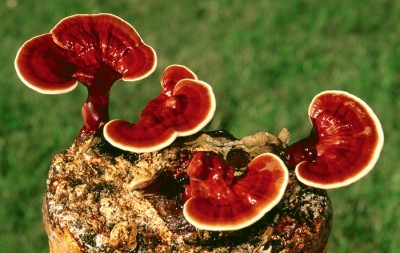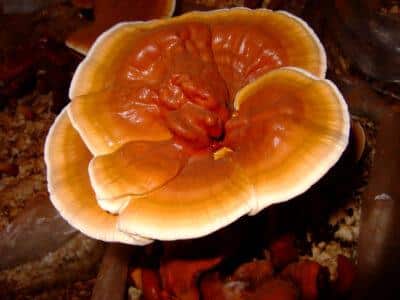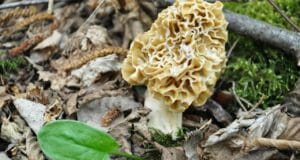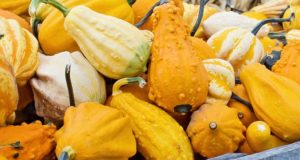
Image source: reishiforce.com
Reishi mushrooms (Ganoderma lucidum) are stunning powerhouses. Perhaps even more breathtaking than their colorful conks of red, orange and white are their amazing health benefits. Locked within the tough walls of this fungus are immune-boosting and cancer-fighting properties. Brewing tea from these woody, non-culinary mushrooms is a simple way to extract these properties and make them available for our benefit.
These amazing mushrooms were first noticed in the Orient thousands of years ago. The glossy red conks were rare, with people searching hundreds and hundreds of trees before finding the kidney shaped mushrooms clinging to the bark. The mushrooms first appear as white tipped antlers. Over months of slow growth, the antlers spread out into glossy red and orange centers with light orange or white edges. The most common Reishi mushroom is the red Reishi, which has a deep chocolate-red color. Originally, these rare conks were reserved for royalty. Reishi is Japanese for “the 10,000 year mushroom.” In Korea and China, the mushrooms were known as “the mushrooms of immortality” and “the resurrection plant.” The ancient world knew the value of these mushrooms long before the modern scientific community began to discover the health-boosting and disease-fighting properties these mushrooms contain.
Today, Reishi mushrooms are associated with many health-related claims, though not all have been affirmed. Claims that Reishi mushrooms treat fatigue and increase strength and stamina lack concrete evidence, but laboratory studies have shown encouraging possibilities for immune system support.
Amazing New “Immune Defense” Super-Pill Scientifically Designed For The Coming Collapse!
Those struggling with HIV and AIDS as well as some kinds of cancer have been treated with Reishi mushroom. The Memorial Sloan-Kettering Cancer Center shares that “Laboratory studies suggest that reishi mushroom may stimulate some cells of the immune system. A small clinical trial showed that reishi can enhance the immune responses in advanced-stage cancer patients.”
Dr. Andrew Weil, a medical doctor, naturopath, and founder and director of the Arizona Center for Integrative Medicine at the University of Arizona, encourages cancer patients to use Reishi mushrooms for their immune function support and anti-inflammatory properties. Doctors and scientists have just begun to scratch the surface of what the Reishi mushroom can offer.
Don’t assume that Reishi mushrooms can only benefit the seriously ill. Its immune system-supporting and anti-inflammatory properties can enhance your life as well. Additionally, Reishi mushrooms have very few side effects. Please talk with your healthcare professional first, though, as certain people should avoid the Reishi Mushroom.

Image source: reishimushroomelite.com/
Pregnant and lactating mothers, those with low blood pressure, and those suffering from blood clotting disorders should avoid Reishi mushrooms. Also, if you are taking any medicines, talk with your health care professional first to make sure there are no drug interactions.
Though Reishi mushrooms were collected mainly from the wild in years past, today most of them are grown commercially. Reishi mushrooms can be purchased from some natural food stores and found in online natural food distributors. They’re typically sold in dried whole pieces (the entire conk) or strips. Tea brewed from dry mushroomshas a somewhat bitter taste. Fresh mushrooms are even more difficult to find, but if you’re willing to experiment with growing your own Reishi mushrooms, it can be rewarding. The homesteading and healthy living blog, milkwood.net, shared that tea brewed from fresh Reishi mushrooms “tasted great, somewhere between green tea and mushrooms.” If growing mushrooms interests you, research further and give it a try! Reishi mushroom tea is available in prepared tea bags as well, but if you desire to try this tea for any length of time, the prepared tea bags can quickly become expensive. Consider brewing your own as it’s quite simple to make and more cost effective.
To Make Reishi Mushroom Tea…
Step #1 – Purchase some dried Reishi mushrooms. The sliced mushrooms can be broken into smaller pieces by hand, while the dried conks will take some determined effort to break them down into suitable pieces for making tea. If you have an especially tough blender, you may be able to grind the mushroom up. In a pinch, you can boil the dried conks whole.
Step #2 – While recommended measurements vary a little, generally, you’ll want to take one tablespoon of dried mushroom and boil it in four cups of water. You can multiply these ratios to make a larger amount of tea if you wish. Once the water boils, let it simmer for two to three hours and then strain it through a coffee filter.
Step #3 – You can drink it hot or chilled. Due to its bitter taste, you may want to add some ginger, honey or other natural sweetener. Reishi mushroom tea keeps well in the refrigerator for three to four days. The benefits are cumulative, so if you’re seeking results from Reishi mushroom tea, you may want to plan on drinking it daily for an extended period of time (some say up to two months or longer).
Though many mysteries of the Reishi Mushroom are still unexplored, what scientists have uncovered has been promising. Cancer patients have seen results, and people are beginning to drink Reishi mushroom tea for its health-boosting abilities. This fungus is no longer reserved only for royalty. See the colorful glossy conks and feel the tough woodiness of this fungus. Brew up a pot, breathe in the earthy steam and take a sip of one of nature’s little known secrets.
Have you grown or gathered reishi mushrooms, and have tips for others? Let us know in the comments section below.
Sign up for Off The Grid News’ weekly email and stay informed about the issues important to you
 Off The Grid News Better Ideas For Off The Grid Living
Off The Grid News Better Ideas For Off The Grid Living




